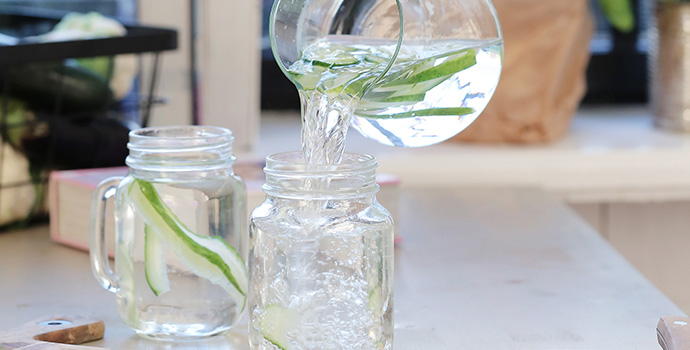How water-rich foods complement your hydration strategy for optimal wellness
While reaching for your water bottle is the most direct path to hydration, nature provides us with delicious alternatives that can supplement our daily water intake. Leading this pack is the humble cucumber – a vegetable that’s literally 95% water. Let’s explore how water-rich foods like cucumbers can enhance your hydration strategy and overall health.
The Cucumber Breakdown: More Than Just Water
Yes, cucumbers are 95% water, but that remaining 5% packs a nutritional punch:
- Vitamin K: Essential for bone health and blood clotting
- Vitamin C: Immune support and skin health
- Potassium: Heart health and blood pressure regulation
- Magnesium: Muscle function and energy production
- Silica: Joint health and skin elasticity
- Fiber: Digestive health (mainly in the skin)
Water-Rich Foods: Your Hydration Allies
Beyond cucumbers, many foods contribute to daily hydration:
- Watermelon: 92% water
- Strawberries: 91% water
- Lettuce: 96% water
- Celery: 95% water
- Tomatoes: 94% water
- Spinach: 91% water
- Bell peppers: 92% water
- Cauliflower: 92% water
The South African Summer Advantage
During our scorching summers, incorporating water-rich foods becomes even more crucial. A typical December day in Gauteng can see temperatures soar above 30°C, increasing fluid loss through perspiration. Adding cucumbers to your braai salad isn’t just refreshing – it’s smart hydration.
Why Food Water Hits Different
Slow-Release Hydration
Water from foods is absorbed differently than plain water. The fiber and nutrients in cucumbers create a “time-release” effect, providing sustained hydration over several hours rather than the quick flush of drinking water alone.
Electrolyte Balance
Natural foods contain minerals that act as electrolytes, helping your body retain and utilize water more effectively. This is particularly important for South Africans dealing with heat and humidity.
Satiety Factor
Water-rich foods help you feel full while contributing minimal calories – a cucumber contains only 16 calories per 100g. This makes them perfect for weight management while staying hydrated.
The 20% Rule: Food’s Hydration Contribution
Research shows that approximately 20% of our daily fluid intake comes from food. For someone needing 2.5 litres of fluid daily:
- 500ml from food
- 2 litres from beverages
This means even perfect cucumber consumption can’t replace proper water intake.
Practical Ways to Add Cucumbers to Your Day
Breakfast
- Add to your morning smoothie
- Top avocado toast with cucumber ribbons
- Include in a green juice
Lunch
- Classic cucumber sandwiches
- Greek salad with feta
- Cucumber gazpacho for hot days
Snacks
- Cucumber slices with hummus
- Pickled cucumbers (though watch sodium)
- Cucumber water infusion
Dinner
- Asian cucumber salad
- Tzatziki sauce
- Cucumber sushi rolls
The pH Connection
Interestingly, cucumbers are alkaline-forming in the body with a pH of about 7.6 once metabolized. When paired with alkaline water (pH 8-9.5), they work synergistically to support your body’s acid-alkaline balance.
Hydration Myths Debunked
Myth: “I eat lots of water-rich foods, so I don’t need to drink much water.” Reality: While helpful, food water can’t replace adequate fluid intake.
Myth: “Cucumber water is as hydrating as alkaline water.” Reality: While refreshing, cucumber water doesn’t provide the same pH benefits or mineral content as quality alkaline water.
Myth: “All water sources are equal for hydration.” Reality: The body absorbs different water sources at different rates and with varying efficiency.
The Perfect Hydration Formula
For optimal hydration, combine:
- Quality water intake: 2-3 litres of premium alkaline water daily
- Water-rich foods: 5-7 servings of fruits and vegetables
- Timing: Spread intake throughout the day
- Climate adjustment: Increase both during hot weather or exercise
When Cucumbers Aren’t Enough
While cucumbers and other water-rich foods are excellent hydration supporters, they can’t address:
- Severe dehydration
- Electrolyte imbalances from excessive sweating
- The body’s need for pure, clean water
- Specific pH balance requirements
The Synergy Effect
Think of hydration as a team sport:
- Alkaline water: Your star player, providing optimal cellular hydration
- Cucumbers & water-rich foods: Support players, adding nutrients and sustained hydration
- Proper timing: Your game strategy
- Consistency: Your training regimen
Making It Work in Real Life
For busy South Africans, here’s a practical daily hydration plan:
Morning: Start with 500ml alkaline water, add cucumber to breakfast Mid-morning: 330ml alkaline water, cucumber slices as snack Lunch: Include a salad with cucumber, 500ml water Afternoon: 500ml alkaline water Dinner: Water-rich vegetables with meal, 330ml water Evening: Light cucumber snack if hungry, small glass of water
The Bottom Line
Cucumbers and other water-rich foods are valuable members of your hydration team, but they’re supplements, not substitutes. The 95% water content in cucumbers makes them an excellent addition to your diet, especially in our warm climate, but your body still needs quality water as its primary hydration source.
For optimal health, combine the natural hydration of water-rich foods with the consistent intake of premium alkaline water. This dual approach ensures you’re not just hydrated, but properly nourished and pH-balanced.
Elevate Your Hydration Game
Ready to pair nature’s hydration helpers with premium alkaline water? Aquamenti pH 9.5 provides the perfect foundation for your complete hydration strategy.
Order Aquamenti Premium Alkaline Water: Call/WhatsApp: 066 025 4860 Email: orders@aquamenti.co.za
Because optimal hydration is about more than just eating your water.
Disclaimer: While water-rich foods contribute to hydration, they should complement, not replace, adequate water intake. Consult healthcare professionals for personalized hydration advice.
Claude does not have internet access enabled. Enable web search for up to date and accurate links.


Add your first comment to this post